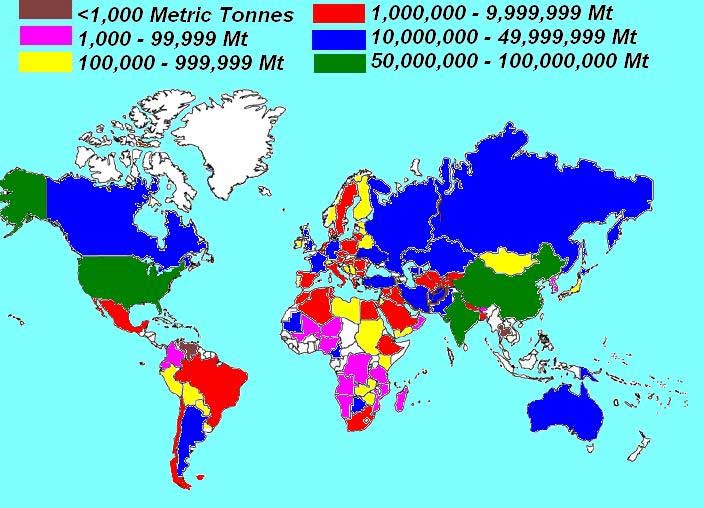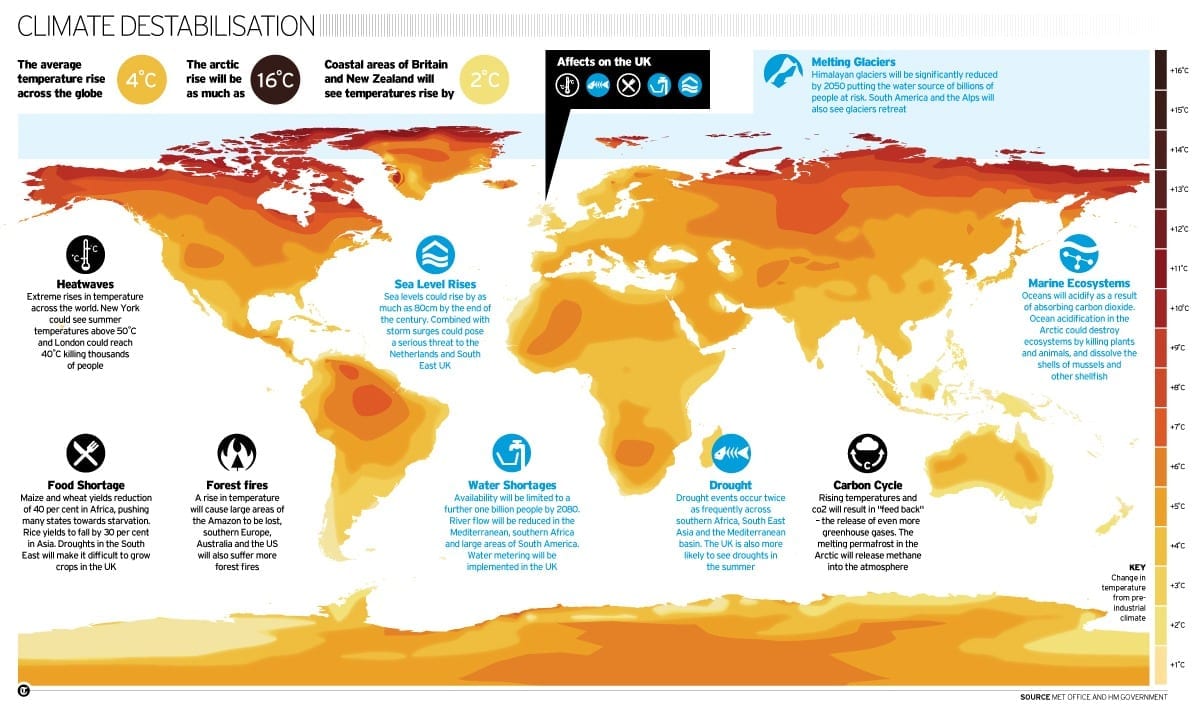
via archive.gramene.org
Future global wheat harvest is likely to be reduced by six per cent per each degree Celsius of local temperature increase if no adaptation takes place. Worldwide this would correspond to 42 million tons of yield reduction, which equals a quarter of current global wheat trade.
Wheat plays an important role in feeding the world, but climate change threatens its future harvest. Without adaptation, global aggregate wheat production is projected to decline on average by six per cent for each additional degree Celsius temperature increase. Worldwide this would correspond to 42 million tons yield reduction for one 1°C global warming.
This result has been generated by an international research consortium to which Natural Resources Institute Finland (previously known as MTT Agrifood Research Finland) substantially contributed. The results were published online in the high impact journal Nature Climate Change.
Losses expected throughout the world
The researchers found out that in response to global temperature increases, grain yield declines are predicted for most regions in the world. Considering present global production of 701 million tons of wheat in 2012, this means a possible reduction of 42 million tons per one degree Celsius of temperature increase.
– To put this in perspective, the amount is equal to a quarter of global wheat trade, which reached 147 million tons in 2013. In addition, wheat yield declines due to climate change are likely to be larger than previously thought and should be expected earlier, starting even with small increases in temperature.
– Therefore it is essential to understand how different climate factors interact and impact food production when reaching decisions on how to adapt to the effects of climate change, points out Prof. Dr. Reimund Rötter from Natural Resources Institute Finland.
Increased variability weakens stability in grain supply
In the study, the researchers systematically tested 30 different wheat crop models against field experiments in which growing season mean temperatures ranged from 15 °C to 26 °C. The temperature impact on yield decline varied widely across field test conditions. In addition, year-to-year variability increased at some locations because of greater yield reductions in warmer years and lesser reductions in cooler years.
– Increased yield variability is critical economically as it could weaken regional and global stability in wheat grain supply and food security, amplifying market and price fluctuations, as experienced during recent years, says Professor Rötter.
Read more: Global warming reduces wheat production markedly if no adaptation takes place
The Latest on: Wheat production
[google_news title=”” keyword=”Wheat production” num_posts=”10″ blurb_length=”0″ show_thumb=”left”]
via Google News
The Latest on: Wheat production
- Farmers’ outcry compels PM to hike wheat targeton April 27, 2024 at 8:33 pm
PM Shehbaz has also directed the Pakistan Agricultural Storage and Services Corporation Limited (Passco) — the national grain procurement and storage agency — to ensure swift buying to help ...
- Is Whole Wheat Bread Good for You? 8 Effects of Eating Iton April 27, 2024 at 5:30 am
A registered dietitian explains some of the possible benefits of eating whole wheat bread, plus one potential side effect.
- NIAGARA DISCOVERIES: Shredded Wheat production at Niagara Falls, New Yorkon April 27, 2024 at 3:01 am
Back in the 1890s, before Shredded Wheat became a household word, a man named Henry D. Perky developed a method for taking whole, unground wheat and turning it into something ...
- A better start for US hard red winter wheat conditionson April 26, 2024 at 10:55 am
With U.S. hard red winter and hard white wheat moving into its crucial vegetative state, U.S. Wheat Associates and its state wheat commission member organizations have started weekly conference calls ...
- Severe drought drops Morocco’s wheat, barley expectationson April 26, 2024 at 7:56 am
RABAT, MOROCCO — With severe drought severely impacting Morocco’s wheat and barley production, imports are expected to increase significantly in 2024-25, according to a report from the Foreign ...
- Wheat Continues to Rally, While Row Crops Take a Breather: Market Watching Weatheron April 26, 2024 at 7:37 am
Wheat continues to rally while row crops take a breather all watching weather says Allison Thompson of The Money Farm. Cattle build on Thursday's reversal on better cash news. The European Commission ...
- Canada may see 5% boost in wheat outputon April 26, 2024 at 5:53 am
OTTAWA, QUEBEC, CANADA — Canada’s grain output in the upcoming marketing year is forecast to increase by nearly 5%, boosted mainly by a surge in wheat production, according to a report from the ...
- Wheat production grows by 5.4% in 2023-24on April 25, 2024 at 9:05 pm
The Federal Committee on Agriculture (FCA) was informed on Thursday that wheat production in Pakistan during the current season (2023–24) increased by 5.4% compared to the previous year. Chaired by ...
- Domestic wheat production soars by 5.4%, 29.69 mln tons output estimatedon April 25, 2024 at 7:07 pm
The Federal Committee on Agriculture (FCA) was informed on Thursday that wheat production in the country during the current season (2023–24) grew by 5.4 percent as compared to the output of the ...
- EU Cuts Wheat Crop Forecast to Four-Year Lowon April 24, 2024 at 5:00 pm
The commission now forecasts EU wheat production at 120.2 MMT, down 600,000 MT from its initial outlook. That would be the smallest wheat crop since 2020. Despite the lower output, the commission ...
via Bing News










